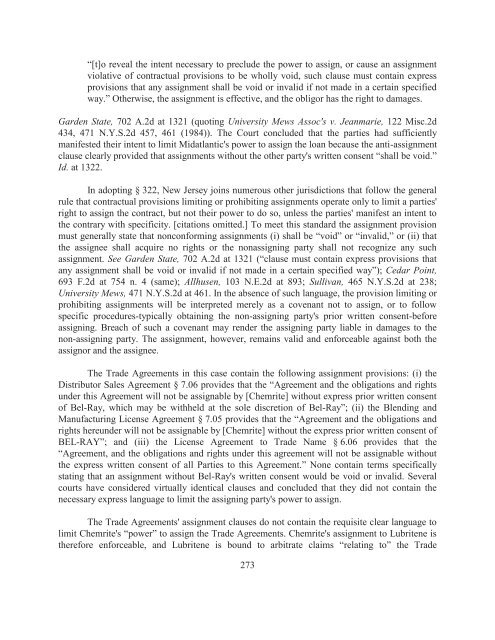Sales and Leases - A Problem-based Approach, 2016a
Sales and Leases - A Problem-based Approach, 2016a
Sales and Leases - A Problem-based Approach, 2016a
Create successful ePaper yourself
Turn your PDF publications into a flip-book with our unique Google optimized e-Paper software.
“[t]o reveal the intent necessary to preclude the power to assign, or cause an assignment<br />
violative of contractual provisions to be wholly void, such clause must contain express<br />
provisions that any assignment shall be void or invalid if not made in a certain specified<br />
way.” Otherwise, the assignment is effective, <strong>and</strong> the obligor has the right to damages.<br />
Garden State, 702 A.2d at 1321 (quoting University Mews Assoc's v. Jeanmarie, 122 Misc.2d<br />
434, 471 N.Y.S.2d 457, 461 (1984)). The Court concluded that the parties had sufficiently<br />
manifested their intent to limit Midatlantic's power to assign the loan because the anti-assignment<br />
clause clearly provided that assignments without the other party's written consent “shall be void.”<br />
Id. at 1322.<br />
In adopting § 322, New Jersey joins numerous other jurisdictions that follow the general<br />
rule that contractual provisions limiting or prohibiting assignments operate only to limit a parties'<br />
right to assign the contract, but not their power to do so, unless the parties' manifest an intent to<br />
the contrary with specificity. [citations omitted.] To meet this st<strong>and</strong>ard the assignment provision<br />
must generally state that nonconforming assignments (i) shall be “void” or “invalid,” or (ii) that<br />
the assignee shall acquire no rights or the nonassigning party shall not recognize any such<br />
assignment. See Garden State, 702 A.2d at 1321 (“clause must contain express provisions that<br />
any assignment shall be void or invalid if not made in a certain specified way”); Cedar Point,<br />
693 F.2d at 754 n. 4 (same); Allhusen, 103 N.E.2d at 893; Sullivan, 465 N.Y.S.2d at 238;<br />
University Mews, 471 N.Y.S.2d at 461. In the absence of such language, the provision limiting or<br />
prohibiting assignments will be interpreted merely as a covenant not to assign, or to follow<br />
specific procedures-typically obtaining the non-assigning party's prior written consent-before<br />
assigning. Breach of such a covenant may render the assigning party liable in damages to the<br />
non-assigning party. The assignment, however, remains valid <strong>and</strong> enforceable against both the<br />
assignor <strong>and</strong> the assignee.<br />
The Trade Agreements in this case contain the following assignment provisions: (i) the<br />
Distributor <strong>Sales</strong> Agreement § 7.06 provides that the “Agreement <strong>and</strong> the obligations <strong>and</strong> rights<br />
under this Agreement will not be assignable by [Chemrite] without express prior written consent<br />
of Bel-Ray, which may be withheld at the sole discretion of Bel-Ray”; (ii) the Blending <strong>and</strong><br />
Manufacturing License Agreement § 7.05 provides that the “Agreement <strong>and</strong> the obligations <strong>and</strong><br />
rights hereunder will not be assignable by [Chemrite] without the express prior written consent of<br />
BEL-RAY”; <strong>and</strong> (iii) the License Agreement to Trade Name § 6.06 provides that the<br />
“Agreement, <strong>and</strong> the obligations <strong>and</strong> rights under this agreement will not be assignable without<br />
the express written consent of all Parties to this Agreement.” None contain terms specifically<br />
stating that an assignment without Bel-Ray's written consent would be void or invalid. Several<br />
courts have considered virtually identical clauses <strong>and</strong> concluded that they did not contain the<br />
necessary express language to limit the assigning party's power to assign.<br />
The Trade Agreements' assignment clauses do not contain the requisite clear language to<br />
limit Chemrite's “power” to assign the Trade Agreements. Chemrite's assignment to Lubritene is<br />
therefore enforceable, <strong>and</strong> Lubritene is bound to arbitrate claims “relating to” the Trade<br />
273


















